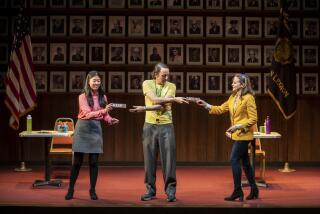Letters to Calendar: Let’s talk Ancient Greeks

- Share via
Ancient Greeks still have the answers
Thank you, Charles McNulty, for this insightful article [“Dilemma Plays Like Greek Tragedy,” Sept. 20]. I have often found that the Greeks dealt with complicated political issues in nuanced ways that put today’s political discourse to shame. As an actor, I played the three male roles in Euripides’ “Trojan Women” during the war in Bosnia-Herzegovina. While in rehearsal, on a stage outfitted as a razor-wired prison yard, we saw photos from Sarajevo of starving prisoners dealing with some of the same issues Euripides dealt with thousands of years earlier. Euripides spoke to us then as Aeschylus can speak to us now. There are no simple answers, but wrestling with the complicated questions the refugee crisis in Europe brings us will help us be the better humans the Greeks wanted us to be.
Christopher Franciosa
Encino
The real N-word should be ‘no’
Kenya Barris, the producer of “black-ish” [“That Word,” Sept. 20], said he [used] the N-word on the show because his daughter [told] him, “It’s just a word … a lot of my friends say it.” Rather than acquiescing to his daughter’s adolescent fantasies, Barris should have informed her that other ethnic groups — Irish, Poles, Italians, Jews, Asians, Mexicans and Puerto Ricans — have been victims of epithets in America, but none of them flaunts such disgusting language. I would speculate that his daughter’s friends have never heard such words, much less used them.
It is one thing for ignorant white racists to use the N-word; it is unconscionable — and a betrayal of our civil rights legacy — for self-promoting African American entertainers to serve as its advocates.
Legrand H. Clegg II
Compton
Humans, cars, we’re equal now
Recently, a traffic cop who left me stranded on a median so more cars could get through the intersection [told me], “Cars are more important than people.”
No more [“L.A. Can Break the Gridlock,” Sept. 20]. By an overwhelming vote of the Los Angeles City Council, people are now officially as important as cars.
Hallelujah!
Joe Markowitz
Los Angeles
Opera in a tux? So East Coast!
Like Roger Walton, I attended L.A. Opera’s “Gianni Schicchi” and “Pagliacci,” and like him, I noticed the wide range of attire [Feedback, Sept. 20].
Unlike Walton, I thought it was great that so many didn’t feel the need to treat a night at the opera like an audience with the pope. If opera is to flourish, it could use the same “come as you are” vibe as a night at the movies. (Full disclosure: I wore jeans — nice ones — and a sweater.)
Far more disturbing were the dressed-to-the-nines ladies sitting next to me who wouldn’t shut up during the performance.
David Weber
West Hollywood
More to Read
The biggest entertainment stories
Get our big stories about Hollywood, film, television, music, arts, culture and more right in your inbox as soon as they publish.
You may occasionally receive promotional content from the Los Angeles Times.









